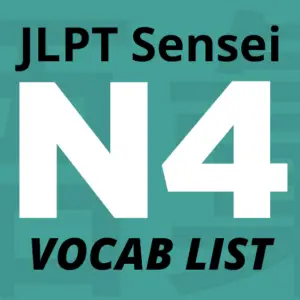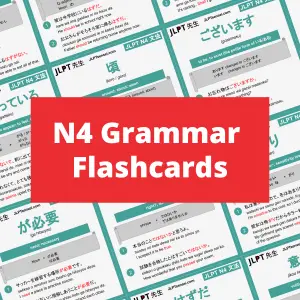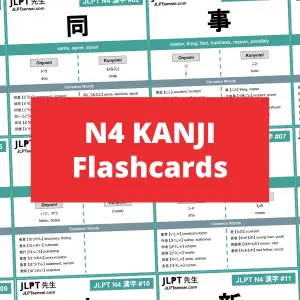
This is a list of the vocabulary that you need to know in order to pass the JLPT N4. In total, you will need to have a vocabulary of about 1,500 words.
This list includes lessons for the most common and important words for you to know, all listed in alphabetical order.
See our full study guide for how to pass the JLPT N4.
- See all JLPT N4 nouns
- Sell all JLPT N4 verbs
- Sell all JLPT N4 adverbs
- See all JLPT N4 adjectives
- See all JLPT N4 pre-noun adjectivals
- See all JLPT N4 particles
- See all JLPT N4 katakana words

Bonus downloads for our members on Patreon:
- All Ebooks and printable PDF lists (grammar, vocab, kanji, etc).
- Flashcards & more! (see all benefits)
| # | ごい | Vocabulary | Type | Meaning |
|---|---|---|---|---|
| 501 | 特急 | tokkyuu とっきゅう | Noun | limited express (train, faster than an express) |
| 502 | 床屋 | tokoya とこや | Noun | barber |
| 503 | 特別 | tokubetsu とくべつ | Noun, Adjective, な-adjective | special; particular; extraordinary; exceptional |
| 504 | 特に | tokuni とくに | Adverb | particularly; especially; in particular; expressly |
| 505 | 泊まる | tomaru とまる | Verb, Godan verb, Intransitive verb | to stay at |
| 506 | 止める | tomeru とめる | Verb, Ichidan verb, Transitive verb | to stop something |
| 507 | 遠く | tooku とおく | Noun, Adverbial Noun | distant |
| 508 | 通る | tooru とおる | Verb, Godan verb, Intransitive verb | to go through |
| 509 | 取り替える | torikaeru とりかえる | Verb, Ichidan verb, Transitive verb | to exchange; to swap; to replace |
| | ||||
| 510 | 到頭 | toutou とうとう | Adverb | finally, after all |
| 511 | 続ける | tsudzukeru つづける | Verb, Ichidan verb, Transitive verb | to continue; to keep up; to keep on |
| 512 | 続く | tsudzuku つづく | Verb, Godan verb, Intransitive verb | to continue |
| 513 | 都合 | tsugou つごう | Noun, Adverb | convenience |
| 514 | 捕まえる | tsukamaeru つかまえる | Verb, Ichidan verb, Transitive verb | to catch |
| 515 | 漬ける | tsukeru つける | Verb, Ichidan verb, Transitive verb | to soak; to pickle |
| 516 | 月 | tsuki つき | Noun | moon |
| 517 | 付く | tsuku つく | Verb, Godan verb, Intransitive verb | to be attached |
| 518 | 妻 | tsuma つま | Noun | (humble) wife |
| 519 | 連れる | tsureru つれる | Verb, Ichidan verb, Transitive verb | to take (someone) with one |
| 520 | 釣る | tsuru つる | Verb, Godan verb, Transitive verb | to fish |
| 521 | 伝える | tsutaeru つたえる | Verb, Ichidan verb, Transitive verb | to report; to tell |
| 522 | 包む | tsutsumu つつむ | Verb, Godan verb, Transitive verb | to wrap |
| 523 | 腕 | ude うで | Noun | arm |
| 524 | 植える | ueru うえる | Verb, Ichidan verb, Transitive verb | to plant; to grow |
| 525 | 動く | ugoku うごく | Verb, Godan verb, Intransitive verb | to move |
| 526 | 伺う | ukagau うかがう | Verb, Godan verb, Transitive verb | to visit |
| 527 | 受ける | ukeru うける | Verb, Ichidan verb, Transitive verb | to take a lesson or test |
| 528 | 受付 | uketsuke うけつけ | Noun | reception (desk); information desk |
| 529 | 生まれ | umare うまれ | Noun | birth |
| 530 | 運転手 | untenshu うんてんしゅ | Noun | driver; chauffeur |
| 531 | 裏 | ura うら | Noun | reverse side |
| 532 | 嬉しい | ureshii うれしい | Adjective, い-adjective | happy |
| 533 | 売り場 | uriba うりば | Noun | selling area |
| 534 | 嘘 | uso うそ | Noun | a lie |
| 535 | 打つ | utsu うつ | Verb, Godan verb, Transitive verb | to hit |
| 536 | 美しい | utsukushii うつくしい | Adjective, い-adjective | beautiful |
| 537 | 移る | utsuru うつる | Verb, Godan verb, Intransitive verb | to move house or transfer |
| 538 | 写す | utsusu うつす | Verb, Godan verb, Transitive verb | to copy or photograph |
| 539 | ワープロ | waapuro | Noun, Katakana | word processor |
| | ||||
| 540 | 別れる | wakareru わかれる | Verb, Ichidan verb, Intransitive verb | to separate |
| 541 | 沸かす | wakasu わかす | Verb, Godan verb, Transitive verb | to boil; to heat |
| 542 | 沸く | waku わく | Verb, Godan verb, Intransitive verb | to boil |
| 543 | 笑う | warau わらう | Verb, Godan verb, Intransitive verb | to laugh; to smile |
| 544 | 割れる | wareru われる | Verb, Ichidan verb, Intransitive verb | to break |
| 545 | 割合 | wariai わりあい | Noun | rate; ratio |
| 546 | 忘れ物 | wasuremono わすれもの | Noun | lost article |
| 547 | 焼ける | yakeru やける | Verb, Ichidan verb, Intransitive verb | to burn; to be roasted |
| 548 | 焼く | yaku やく | Verb, Godan verb, Transitive verb | to bake; to grill |
| 549 | 役に立つ | yakunitatsu やくにたつ | Verb, Godan verb, Expression | to be helpful |
| 550 | 約束 | yakusoku やくそく | Noun, Suru verb | promise |
| 551 | 止む | yamu やむ | Verb, Godan verb, Intransitive verb | to stop |
| 552 | やっぱり | yappari | Adverb | as I thought |
| 553 | 優しい | yasashii やさしい | Adjective, い-adjective | kind |
| 554 | 痩せる | yaseru やせる | Verb, Ichidan verb, Intransitive verb | to become thin |
| 555 | 柔らかい | yawarakai やわらかい | Adjective, い-adjective | soft |
| 556 | 汚れる | yogoreru よごれる | Verb, Ichidan verb, Intransitive verb | to get dirty |
| 557 | 喜ぶ | yorokobu よろこぶ | Verb, Godan verb | to be delighted |
| 558 | 寄る | yoru よる | Verb, Godan verb, Intransitive verb | to visit; to drop by |
| 559 | 予習 | yoshuu よしゅう | Noun, Verb, Suru verb | preparation for a lesson |
| 560 | 予定 | yotei よてい | Noun, Suru verb | plan |
| 561 | 用 | you よう | Noun, Suffix | business; task; errand; use; purpose |
| 562 | 用意 | youi ようい | Noun, Verb, Suru verb | preparation; arrangements; provision; getting ready |
| 563 | 用事 | youji ようじ | Noun | tasks; things to do; errand; business (to take care of) |
| 564 | 予約 | yoyaku よやく | Noun, Suru verb | reservation |
| 565 | 湯 | yu ゆ | Noun | hot water |
| 566 | 指 | yubi ゆび | Noun | finger |
| 567 | 指輪 | yubiwa ゆびわ | Noun | finger ring |
| 568 | 夢 | yume ゆめ | Noun | dream |
| 569 | 揺れる | yureru ゆれる | Verb, Ichidan verb, Intransitive verb | to shake |
| | ||||
| 570 | 残念 | zannen ざんねん | Noun, Adjective, な-adjective | regrettable; unfortunate |
| 571 | 全然 | zenzen ぜんぜん | Adverb | not entirely (used in a negative sentence) |
JLPT N4 vocab List total: (571)
Currently viewing page 6 of 6
JLPT N4 Study Guide
JLPT N4 Grammar Master [e-book]
Complete Study Guide
This e-book includes every grammar point you need to know in order to pass the JLPT N4, with detailed usage notes and numerous example sentences.
Pages: 293.
Grammar lessons: 131.
N4 Flashcards
*NOTE* Officially, there are no kanji, vocabulary, or grammar lists for the JLPT. As a result, it is not possible to be certain which kanji, words, or grammar will or will not appear in a given test. Our study lists are based on prior test data and comparisons with other available lists of JLPT kanji, vocabulary, grammar, etc.


